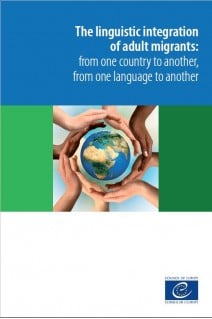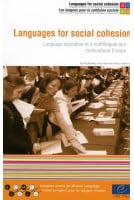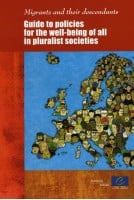



The linguistic integration of migrants affects every aspect of settling in a new country (employment, health, etc.). The aim of this collection of texts is to propose a number of specific measures member states can take to help adult migrants become acquainted with the language of the host country. The main focus is on organising language courses that meet migrants’ real communication needs. It is not enough for authorities simply to consider the technical aspects of such courses, they should also design and conduct them in accordance with the fundamental values of the Council of Europe.
A number of issues concerning the linguistic integration of adult migrants are presented here, beginning with the notion of linguistic integration itself. Family reunion, the nature of citizenship and the function of language tests, among others, are dealt with from the point of view of language and language use. Readers are invited to reflect on the type of language competences that need to be acquired as well as an appropriate use of the Common European Framework of Reference for Languages. The collection also sets out approaches and instruments designed to assist in implementing effective policies.
Contents
ACKNOWLEDGEMENTS
FOREWORD
PREFACE
INTRODUCTION
CHAPTER 1 ‒ HUMAN RIGHTS, EQUITY AND QUALITY
Guiding principles
Linguistic integration
Family reunification
Language tests
CHAPTER 2 ‒ DESIGNING LANGUAGE PROGRAMMES
Language policies for adult migrants: from values to education
Taking account of the diversity of migrants' contexts
The Common European Framework of Reference for Languages (CEFR) and levels of language proficiency
The CEFR and the development of training schemes for adult migrants
Descriptions of CEFR reference levels for individual languages (RLD)
Language repertoire
Language needs
Linguistic profiles and profiling
Tailor-made courses
CHAPTER 3 ‒ DELIVERING LANGUAGE PROGRAMMES
Developing curricula and course programmes for adult migrants
Motivation in language training for adult migrants
Teaching methodology
Literacy
Languages for work
Teacher training for language teachers working with adult migrants
CHAPTER 4 ‒ ASSESSING LANGUAGE PROFICIENCY AND LANGUAGE COURSES
Assessment of language learning
European Language Portfolio
Quality in education and training for migrants
Language courses, assessment and quality assurance
CHAPTER 5 ‒ TAKING ACCOUNT OF THE INTERCULTURAL PERSPECTIVE
Linguistic goodwill
Language of origin
Educational culture
Knowledge of society
Citizenship





The linguistic integration of migrants affects every aspect of settling in a new country (employment, health, etc.). The aim of this collection of texts is to propose a number of specific measures member states can take to help adult migrants become acquainted with the language of the host country. The main focus is on organising language courses that meet migrants’ real communication needs. It is not enough for authorities simply to consider the technical aspects of such courses, they should also design and conduct them in accordance with the fundamental values of the Council of Europe.
A number of issues concerning the linguistic integration of adult migrants are presented here, beginning with the notion of linguistic integration itself. Family reunion, the nature of citizenship and the function of language tests, among others, are dealt with from the point of view of language and language use. Readers are invited to reflect on the type of language competences that need to be acquired as well as an appropriate use of the Common European Framework of Reference for Languages. The collection also sets out approaches and instruments designed to assist in implementing effective policies.
Please note that in accordance with our terms & conditions, PDF/epubs may only be purchased by private individuals.
